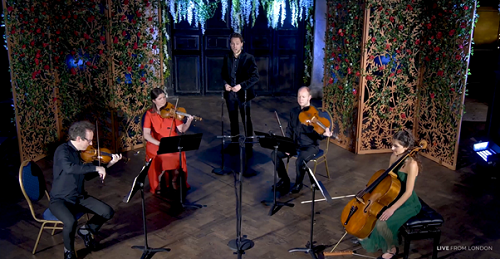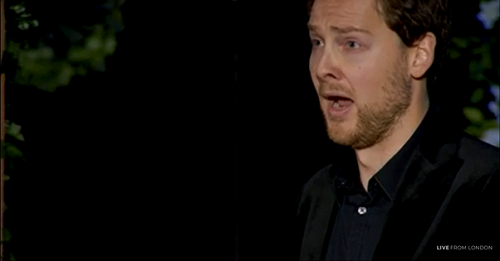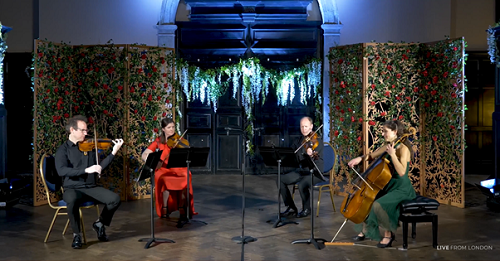VOCES8’s Live from London, Spring series continues to offer diverse delights. Recent performances by Apollo 5 and Stile Antico framed The Winter House – an interactive family concert created and directed by Paul Smith, and narrated by Stephen Fry and Timothy Vaughan. This weekend saw VOCES8 return to St Anne and St Agnes in the City of London to host and participate in an American-themed concert, To the New World, curated by the Carducci String Quartet.
The Carducci Quartet were joined by bass-baritone Frederick Long in Samuel Barber’s Dover Beach, a setting of Matthew Arnold which dates from Barber’s student days at the Curtis Institute. Written in 1851, Arnold’s poem seems, strangely, a work for our times. Nature – the movements and sounds of the sea on the shore – inspires hopes, dreams and love, but, as Arnold moves from a personal to a universal perspective, such energies are countered by a metaphoric ‘sea of faith’ which at first comforts and then deserts the world and mankind. The latter is faced with only troubling juxtapositions: past and present; certainty and doubt; hope and despair. Man stands vulnerable and frail, symbolised by the ‘naked shingles of the world’. We hear an apocalyptic cry: a ‘melancholy, long, withdrawing roar’ evoking the pain and eternal suffering which will afflict man if he loses his faith in God. It’s a pessimistic vision.

The Carducci Quartet captured the tension which disturbs the musical pictorialism at the opening of Barber’s Dover Beach: ‘The sea is calm to-night./ The tide is full, the moon lies fair/ Upon the straits’, but the steady motions and ceaseless flow of the iambic rhythm of the poetry are destabilised by notes of imbalance and unease in the score. “Only … Listen!” warns the singer. Frederick Long was a poised yet forthright guide, his beautifully coloured bass-baritone full, firm and strong, his diction excellent, as he pointed to the “grating roar of pebbles” conjured by the strings’ motions. The growing instrumental weight suggested the sea’s perpetual power – “Begin, and cease, and then again begin” – and then narrowing range and increasing concentration of the vocal line conveyed the “eternal note of sadness” which the slow cadence of the waves brings in.
With effortless projection, Long both bewailed and protested at the sea’s “melancholy, long, withdrawing roar”, and in his energised defence through human love – “Ah, love, let us be true/ To one another!” – hope, defiance and despair seemed strangely fused. There was a heavy finality as the Carducci built towards the closing of images of “ignorant armies” that clash on the “darkling plain”: in the mists of confusion and desolation, man no longer recognises friend from foe, and with a bitter twist on “clash” Long drove home this irony. The ‘struggle and flight’ of the 19th century, with its technical, industrial, scientific and philosophical upheavals, seem just as relevant today, but in the years immediately after the Second World War, the young Barber seemed to find some intimation of the resilience of man in the face of eternal challenges – a hope that was expressed in the settling, easing and untangling of the strings as they moved towards the consoling final cadence, perhaps promising that the waves will wash the shore once more, the sun will follow the moon, and love between individuals may overcome existential despair. Long’s lyrical, elegiac, dramatic monologue was both impressive and profound.

The Carducci Quartet were joined by VOCES8 for a performance of Sacred Heart (‘Ubi Caritas III’) by the ensemble’s former composer-in-residence, Ola Gjeilo. The vocal mellifluousness and blended precision are familiar, but here the sonorities, further enriched by the strings, seemed to offer something of the spiritual comfort that Arnold sought. There was affirmation in the unaccompanied rising string motifs before the voices’ vivid declaration, “Et in medio nostri sit Christus Deus.” (And in the midst of us be Christ our God.) The integration of voices and strings made this true chamber music.
Before the vocal items, the Carducci Quartet performed Dvořák’s ‘American’ String Quartet. The Allegro ma non troppo drew energy from a wealth of music details – animated oscillations, resounding cello pizzicati, the viola’s rich-toned opening theme. This was a wonderful fusion of lyricism and dynamism, but the players did not neglect the restlessness in the music, particularly in the harmonically roving development section with its snapping rhythms and stark juxtapositions of texture and timbre. With the reprise of the second soulful theme in the recapitulation came joy and ease, though – and something of that sense of open vistas and freedom that we have been missing so much.
I wasn’t convinced that at the start of the Lento time stood still, as I feel that it should; there was intensity, but it lacked concentratedness and it took a while for the players – characterful musicians in their own right – to fully settle and cohere. But the Molto vivace had a truly optimistic spring in its step, buoyant but never a scramble, and though the music is busy, the textures were transparent and clean. In the trio section, the contrast between tense eeriness – quasi sul ponticello – and explosive outbursts meant that the tension never wavered. The Finale: vivace ma non troppo swept gleefully along on a wave of melodiousness and syncopated vitality, passages of heady energy countered by beautifully soulful reflectiveness.

The Carducci Quartet recently performed Philip Glass’s Third String Quartet – meditative reflections on the life of Yukio Mishima, drawing on music which was originally composed for Paul Schrader’s 1985 film, Mishima: A Life in Four Chapters – in the closing concert of last year’s Ryedale Festival Online. Here, at the start (‘1957-Award Montage’) the interlocking motions were gentle and warm: they seemed to me almost an aural representation of visual mathematical transformations –simultaneously complex yet inevitable, cerebral yet beautifully expressive. Emma Denton’s focused cello line was a wonderful anchor for the ceaseless movement, and as the motions gained in strength and weight, they became not just shapes but structures too. The second movement (‘November 25-Ichigaya’) was a masterclass in elegiac delicacy, while in ‘1934-Grandmother and Kimitake’ which follows the Carducci relished the incisive timbres and rhythmic animation. Insistent repetitions, the strings bearing the full weight of bow, the tone rich and grainy, created massive blocks and shifts in the fourth movement, aptly named ‘1962-Body Building’. In the final two movements (‘Blood Oath’ and ‘Mishima/Closing’) a yearning quality was countered and denied by abrupt silences. The final fading was stark and exposed.
VOCES8 invited the Carducci Quartet to close the concert with them in characteristically upbeat fashion, with Blake Morgan’s arrangement of Dougie MacLean’s Caledonia. Stereophonic ensemble riches were balanced by lovely solos from bass Jonathan Pacey and tenor Blake Morgan, and the female voices seemed to be a particularly honeyed trio of sweetness of this occasion. Quiet acapella homophony brought the curtain down on an eclectic but totally persuasive programme.
All concerts in this series are available on demand to tickets holders from the date of broadcast until 11pm BST on 30th April. The next concert will be performed by Joanna MacGregor on 7th March 2021 (2pm EST | 7pm GMT). See: Live from London, Spring.
Claire Seymour
Philip Glass – String Quartet No.3, ‘Mishima’; Dvořák – String Quartet Op.96, ‘American’; Samuel Barber – Dover Beach; Ola Gjeilo – Sacred Heart; Dougie MacLean (arr. Blake Morgan) – Caledonia
Carducci String Quartet (Matthew Denton & Michelle Fleming [violins], Eoin Schmidt-Martin [viola], Emma Denton [cello]), Frederick Long (bass-baritone), VOCES8.
ABOVE: The Carducci Quartet and VOCES8.